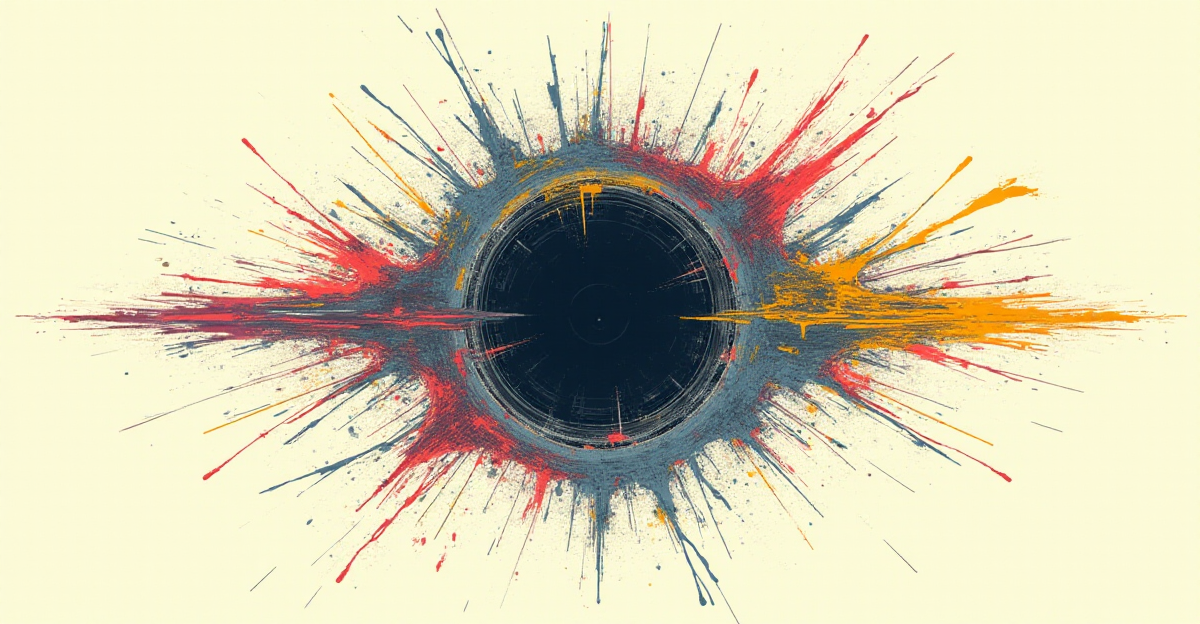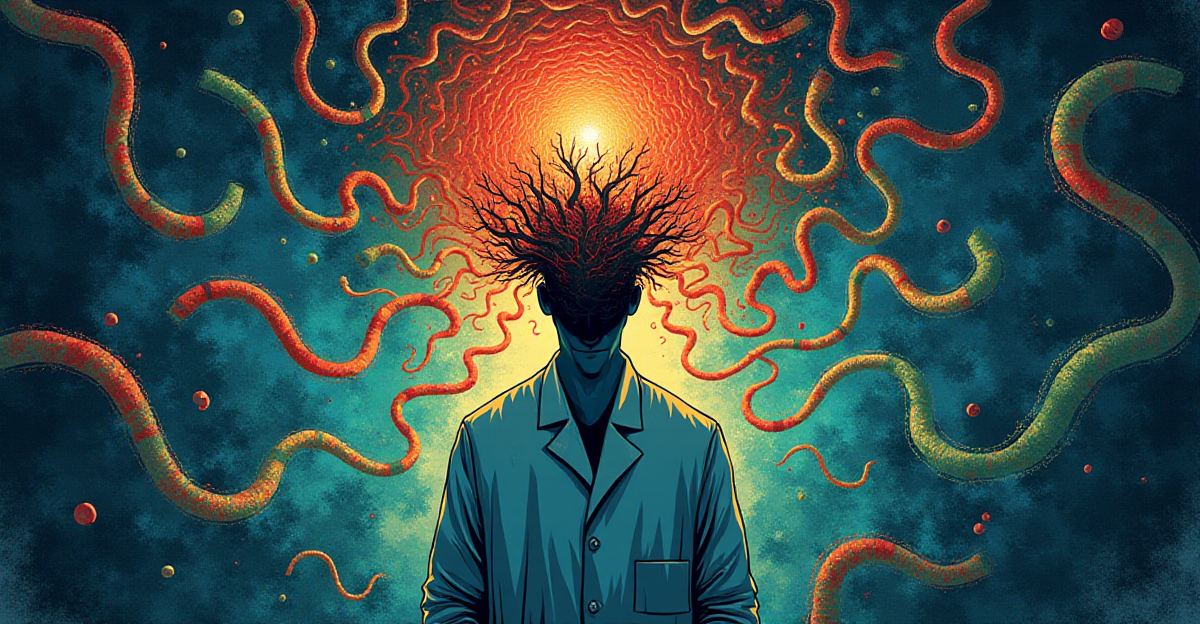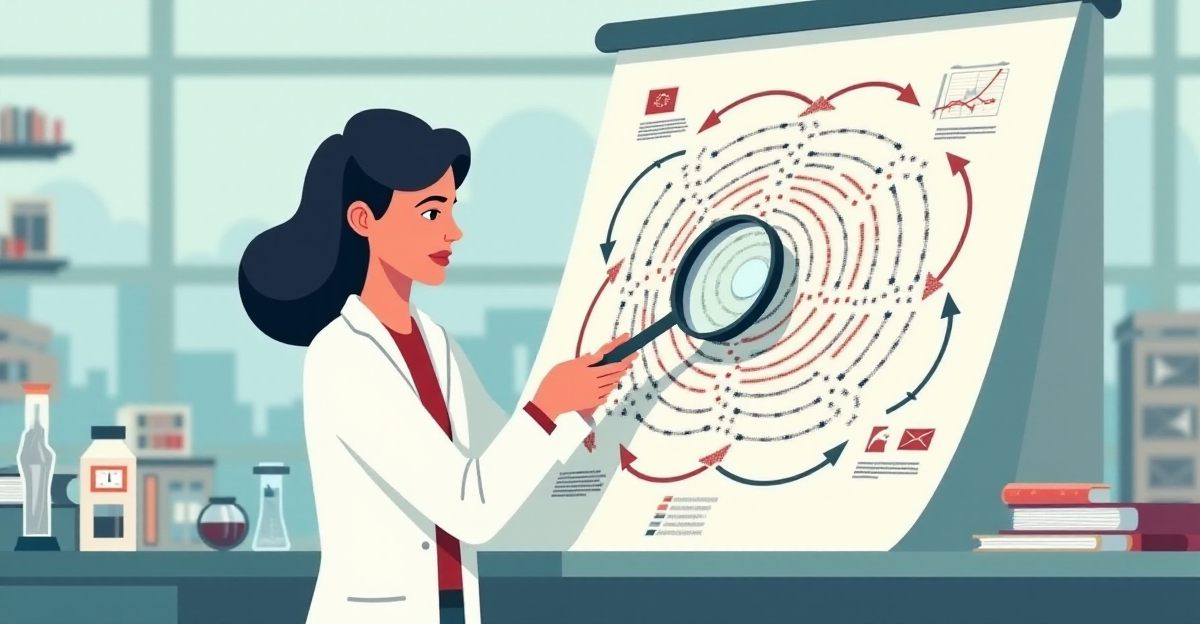Scientific study can be influenced by cognitive biases, therefore producing distorted findings and interpretations. Various forms of cognitive biases will be discussed in this paper together with how they influence research and what researchers are doing to minimize them.
Table of Contents
- What Is Cognitive Bias?
- Types of Cognitive Bias in Science
- The Impact of Cognitive Bias on Scientific Research
- How to Mitigate Cognitive Biases in Research
What Is Cognitive Bias?

Even when you are shown data contradicting your beliefs, have you ever noticed how firmly you hang onto them? Alternatively, even if it’s not totally factual, the first information you come across on a subject might greatly shape your opinions. These are only a few instances of cognitive bias, which are unintentional mental quick cuts that could skew our decisions and perceptions. Even in the field of scientific research, cognitive bias is a typical occurrence that influences all of us and may surprise you.
Cognitive bias results from our brains’ continuous search for quick conclusions and means of simplifying difficult material. In some cases these mental short cuts might be useful since they enable us to act fast when needed. In science particularly, they can sometimes result in erroneous findings. These prejudices might affect our interpretation of facts, reach decisions, and finally our perspective on the surroundings. Every day we all have cognitive bias, which occasionally results in decisions we might come to regret.
How Cognitive Bias Affects Scientific Research
Particularly in scientific study, cognitive bias can cause a distorted view of the world and have actual repercussions. Let’s investigate some typical instances:
- Confirmation bias: This is the tendency to favor information that confirms our existing beliefs while ignoring evidence that contradicts them. Imagine a scientist studying the effects of a new drug. If they already believe the drug is effective, they might be more likely to focus on data that supports this view, while dismissing data that suggests otherwise. This can lead to biased research findings and an incomplete understanding of the issue. Have you ever fallen victim to confirmation bias in your own life? Perhaps you ignored evidence that challenged your political views or clung to a belief despite contradictory information.
- Availability heuristic: This bias makes us overestimate the importance of information that is easily available or readily recalled. For instance, a study published in a prestigious journal might get more attention and be considered more important than a study published in a less well-known journal. This bias can lead to an overemphasis on certain research findings, creating a distorted view of the scientific landscape. Think about how easily we recall news stories that confirm our biases. Often, we hear about a dramatic event, like a plane crash, and it makes us overestimate the likelihood of similar events happening.
- Anchoring bias: This bias leads us to heavily rely on the first piece of information we receive, even if it is irrelevant. In scientific research, this can occur when researchers are influenced by previous findings or their own initial assumptions. For example, a researcher who begins their study with a strong preconceived notion about the outcome might interpret data in a way that supports their initial assumptions. You might see this bias in action when you’re negotiating a price for a car. The first price offered often sets the anchor, even if it’s not a fair price, influencing how we perceive the value of the car.
- Framing effect: This bias impacts our decisions based on how information is presented. In research, researchers might unintentionally influence the results of their studies by using specific wording or framing their questions in a way that leads participants to a particular conclusion. For example, a study on the effectiveness of a new treatment might get different results depending on how the question is worded. If a study is framed in a way that highlights the potential risks of a treatment, participants might be more likely to report negative experiences, even if they are minor.
Mitigating Cognitive Bias in Scientific Research
How therefore may cognitive bias in scientific study be avoided? Knowing these possible hazards, scientists have created plans to reduce their impact.
Using blind studies, in which neither the researchers nor the subjects know who is getting the treatment nor a placebo, is one crucial tactic. This lessens the effect of cognitive bias throughout the research procedure. Peer review, another crucial tactic, is the evaluation of the methods and findings of the research by independent specialists to guarantee that the study satisfies high scientific criteria and that any possible biases are found and corrected.
To better understand typical cognitive biases and how to prevent them, scientists are also urged to take part in seminars and trainings. Knowing these possible traps helps researchers to be more cautious of their own presumptions and data interpretation. Maintaining scientific integrity also depends critically on the procedure of repeating research results. By means of replication of a study, different researchers can assist to confirm or deny the conclusions of the first study and so minimize the influence of cognitive bias.
Scientific study can become more objective and dependable if one knows the nature of cognitive bias and uses techniques to reduce it. One should be conscious of these prejudices and scrutinize research results. This awareness can help to guarantee that reliable and correct data drives scientific advancement.
Types of Cognitive Bias in Science

Imagine a ground-breaking scientific discovery embraced by the scientific community and praised by the media. What if, however, prejudice affected this discovery? Sadly, cognitive bias is a ubiquitous phenomena influencing our judgments and conclusions even in the field of scientific research. Although these mental short cuts can help one negotiate difficult circumstances, they can also cause distorted results, therefore impeding the advancement of correct science.
It may surprise you to find that research bias can affect even the most outstanding experts. This is so because often functioning below conscious awareness, cognitive biases are firmly ingrained in our mental processes. Reliability of scientific results depends on an awareness of and acceptance of these prejudices.
Common Types of Cognitive Bias in Data Interpretation
Cognitive biases can show up in several forms that influence our interpretation of data, knowledge, and conclusions drawing process. Let’s explore several typical forms of cognitive bias that might affect scientific inquiry:
- Confirmation bias: This bias makes us favor information that confirms our existing beliefs while dismissing evidence that contradicts them. For example, a researcher might be more likely to focus on data that supports their hypothesis, while ignoring data that challenges it. This can lead to biased conclusions and a skewed understanding of the research findings.
- Availability heuristic: This bias causes us to overestimate the importance of easily accessible or readily recalled information. This can lead to an overemphasis on certain research findings that are easily available, even if they are not representative of the overall body of evidence. For example, you might have heard about the case of a specific drug leading to severe side effects, but this information might be overrepresented in your memory due to its sensational nature.
- Anchoring bias: This bias makes us heavily rely on the first piece of information we receive, even if it’s irrelevant. Imagine a researcher starting a study with a preconceived notion about the outcome. They might then interpret data in a way that supports their initial assumptions, even if the data itself is inconclusive.
- Framing effect: This bias impacts our decisions based on how information is presented. For example, researchers might unintentionally influence the results of their studies by using specific wording or framing their questions in a way that leads participants to a particular conclusion.
Real-Life Examples
Consider a real-world instance of how cognitive bias could affect scientific inquiry. Early in the 20th century, the conventional wisdom on heredity was predicated on the concept that acquired features might be passed on to progeny. Among many eminent scientists, including Jean-Baptiste Lamarck, this hypothesis—known as Lamarckism—was backed. But the evidence for Lamarckism was finally weak, and the modern theory of evolution—which is predicated on natural selection—was finally adopted to replace the notion.
Lamarckism was so well-liked for so long in part because it fit many anecdotal observations. People observed, for instance, that blacksmiths sometimes have powerful arms and reasoned that their children would inherit this quality. Later on, though, this observation was demonstrated to be the outcome of the availability heuristic—people were simply more likely to remember blacksmiths with strong arms since those examples were more readily available to them. Actually, there is no data showing acquired features could be passed on to next generations.
The narrative of Lamarckism emphasizes the need of realizing cognitive bias in scientific investigation. These prejudices can mislead even the most intelligent scientists, hence it is imperative to question research results and take into account other explanations.
The Importance of Thinking Critically
Overcoming cognitive distortions calls for critical thinking. It entails objective analysis of data, questioning presumptions, and weighing several explanations. These possible hazards must be known to scientists if they are to guarantee the objectivity and correctness of their studies. Through active participation in critical thinking, researchers can reduce cognitive biases’ influence and forward scientific knowledge.
Natural component of human mind is cognitive bias. To guarantee the accuracy and objectivity of scientific study, one must be aware of these possible hazards, nevertheless. Understanding the several forms of cognitive bias and adopting critical thinking would help us to create a more solid and trustworthy scientific scene.
The Impact of Cognitive Bias on Scientific Research

Though everyone, including those educated in strict scientific methods, might be influenced by cognitive bias, you might believe that scientists are immune to biases. These mental short cuts might skew our view and affect our choices, therefore compromising the validity and correctness of scientific study.
How Cognitive Bias Affects Scientific Research
From the experimental design to the data analysis and interpretation, cognitive bias can influence all aspect of the research process. Say you are a researcher working on a project. Have you ever found yourself only looking for material to support your current opinions? That points to confirmation bias. Common scientific prejudice can cause distorted data interpretation and maybe biassed results. A researcher can, for instance, ignore data that refutes their hypothesis in favor of data supporting it. This can produce erroneous conclusions and a distorted perspective of the research results.
Still another mental trap influencing our decisions is the availability heuristic. This bias leads us to overstate the value of readily available, easily remembered knowledge. For instance, even if they are not typical of all the studies on a given drug, a researcher who reads multiple studies on a particular drug having significant side effects may be more prone to overemphasize those side effects.
Cognitive Bias and Data Interpretation
Furthermore affecting our interpretation of data is cognitive bias. Consider a researcher beginning a project already certain they have the solution. This type of anchoring bias is when, even if it is useless, we mostly depend on the first piece of information we come onto. Even if the evidence itself is inconclusive, this can cause a researcher to view data in a way that supports their first presumptions.
The framing effect is yet another cognitive bias that might influence our data interpretation. This inclination shapes our decisions depending on the way the facts is presented. For instance, by phrasing their questions in a way that causes participants to reach a given conclusion or by using particular language, researchers may inadvertently affect the outcome of their study.
The Asian disease problem, a psychological experiment showing how greatly people’s choices may be influenced by the language of a problem, is one well-known instance of the framing effect at operation. Participants in this experiment were given two choices for handling a scenario including a fatal disease epidemic. The participants’ decisions were much influenced by the way the alternatives were framed: in terms of lives saved against lives lost. This example emphasizes how much our opinions may vary depending on even little variations in the way knowledge is presented.
Unquestionably, cognitive bias has an impact on scientific study. Inaccurate conclusions, a lack of scientific neutrality, and even research process integrity could all result from it. Researchers should thus be conscious of these prejudices and actively try to minimize their consequences. Stronger critical thinking abilities and ways to reduce bias can help us to aim for more solid and dependable scientific research.
How to Mitigate Cognitive Biases in Research

Have you ever found yourself justifying a point of view even in front of data contradicting it? Alternatively you might have fallen for a marketing ploy that sounded too good to be true. These are only a handful of the ways in which cognitive distortions could affect our choices. These prejudices are conceptual short cuts our brains take to streamline difficult material. Still, they can also mislead us, particularly in relation to scientific research.
Everybody has cognitive biases, which can influence all aspect of the research process—from data interpretation to experiment design. Consider, for instance, a researcher driven by a certain idea. They may downplay or ignore data that runs against to their theory, yet unconsciously choose facts that backs it. Common confirmation bias like this could provide erroneous results. To guarantee science accuracy in research, we must first be conscious of these prejudices and aggressively try to minimize their impact.
Understanding the Impact of Cognitive Biases in Research
Research result validity and quality might be much influenced by cognitive prejudices. One such is confirmation bias, as was already mentioned; nevertheless, there are many more. Selective bias, for instance, results from researchers selecting subjects that distort the findings. They might unintentionally choose subjects more likely to have particular traits supporting their theory. Results might thus be erroneous. Another instance is availability bias, in which case we exaggerate the probability of an event depending on our ease of recollection of instances of it. If we have lately observed a specific kind of incident, we could be more prone to believe that it occurs more often.
Strategies for Mitigating Bias in Research
How then may we avoid these prejudices in our studies? There are numerous ways we might lessen the effect of cognitive distortions.
- Blinding: In blind studies, researchers and participants are unaware of who is receiving the treatment and who is receiving a placebo. This helps to minimize the influence of cognitive biases in both the research and the participants.
- Critical thinking: Critical thinking is a powerful tool for researchers. It involves analyzing information objectively, challenging assumptions, and considering multiple perspectives. By actively engaging in critical thinking, we can avoid jumping to conclusions and minimize the impact of biases.
- Collaboration and diversity: Having a diverse group of researchers with different backgrounds and perspectives is vital for identifying potential biases. This collaboration helps to challenge assumptions and encourages a more comprehensive analysis of research data.
- Replication: The process of replicating research findings is crucial for ensuring accuracy and reliability. When other researchers replicate a study, they can confirm or refute the initial findings and identify any biases that may have influenced the original study.
- Training and awareness: Researchers should participate in workshops and training programs to learn about cognitive biases and how to mitigate them. By understanding the nature of these biases, we can be more aware of their potential influence and actively work to avoid them.
One well-known instance of how confirmation bias could influence scientific research is the Mozart Effect. Early research indicated that listening to Mozart’s music might improve cognitive skills. Scientists made great publicizing of this result Still, later research couldn’t match the findings. Studies contradicting the Mozart Effect theory might have been overlooked while researchers more willing to publish those supporting it could have
Research can become more objective and dependable if one knows the type of cognitive prejudices and uses techniques to reduce them. One should be conscious of these prejudices and assess research results with critical eye. This awareness can help to guarantee that reliable and correct data drives scientific advancement.











